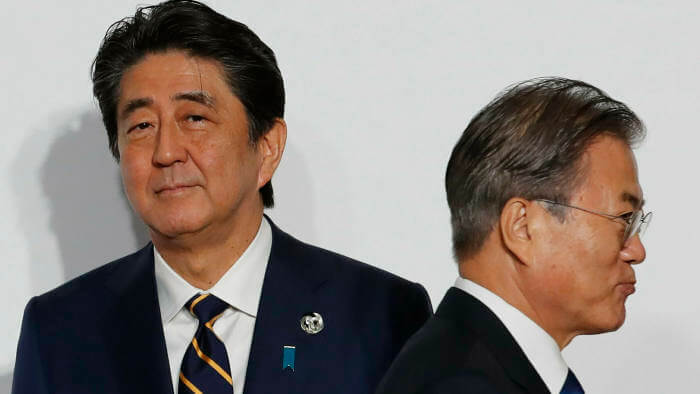At an event celebrating South Korea’s Liberation Day from Japanese forces at the end of World War II, the government expressed strong anti-Japanese sentiments. Kim Won-woong, the President of the Heritage of Korean Independence organisation, denounced “pro-Japanese traitors” including South Korea’s first President, Syngman Rhee, whom he accused of “colluding with pro-Japanese to consolidate his post-liberation power”.
HKI is an organisation responsible for distributing settlements and awards to families and descendants of Independence fighters. Incumbent President Moon Jae-in appointed HKI’s head Kim, who, in his Liberation Day address, condemned Ahn Eak-tai, the composer of South Korea’s national anthem, for his alleged pro-Japan activities. A part of his speech focused on moving of graves of “69 traitors” from a national cemetery as part of efforts to “straighten out history”.
The ruling Democratic Party of Korea (DPK) is backing Kim’s comments against Tokyo, and the party’s next presidential hopeful, Rep. Lee Nak-yon, supported HKI and its initiatives. Seoul and Tokyo’s relations have frayed since last year, with the issue of compensating war-time labour becoming a point of contention.
The two states are at loggerheads over a South Korean court initiating proceedings against Japan’s Nippon Steel Corp. to pay four former World War II workers. Japan has maintained that the South Korean court ruling is a “violation of international law” because it counters the 1965 bilateral agreement signed between the countries in 1965. According to the treaty, Japan paid $300 million in grants and $200 million in low-interest loans on the understanding that all of South Korea’s “claims were settled completely and finally”. In response, South Korea’s Supreme Court ruled that agreements such as those signed in 1965 do not “impede individual victims’ rights to seek redress”.
Following Kim’s vociferous anti-Japan statement, South Korean President Moon showcased his willingness to “sit down” with his Japanese counterpart Shinzo Abe at any time to resolve the longstanding dispute. At the Liberation Day event, President Moon said, “The government has consulted with Japan on a smooth resolution, on which victims can agree, and leaves the door of consultations wide open now as well. Our government is ready to sit face to face with the Japanese government at any time.”
South Korea’s Supreme Court ruling against Japanese companies in 2018 resulted in a trade war between the two states. Frustrated with the court proceedings, in 2019, Japan put into place restrictions on several high-tech exports to South Korea, and also downgraded Seoul’s status as a trusted trading partner. South Korea retaliated by boycotting several Japanese products. Last week, Nippon appealed the South Korean court’s decision of seizing its assets to compensate the victims of war-time labour. The appeal was rejected. However, the decision is not final because a higher court will further consider the company's appeal under South Korea’s three-tiered judicial system. Another flashpoint erupted with Japan using the “Rising Sun” flag for the Tokyo Olympics. South Korea took offence to the flag, which is a centuries-old symbol used by Japan’s military during World War II.
In August last year, Seoul’s local government planned to set up thousands of posters supporting the boycott of Japnese goods, but growing public criticism forced the government to take the signs down. Despite increasing anti-Japan sentiments in South Korea, the public criticism of the Seoul government’s move to embrace the boycott movement indicated that reconciliation of ties may have been possible. This possibility, however, seems to be waning, given Kim’s critical comments against Tokyo at the televised Liberation Day celebrations, which were supported by the government. Park Won-gon, a professor of international politics, Handong Global University, said, “I think the government’s basic view is reflected in Kim’s speech, and, in that respect, Korea and Japan are unlikely to find a way to break the current deadlock in their ties at the moment.”
South Korea-Japan Relations Continue to Fray Over WWII Labour Compensation
South Korean leaders launched a fresh attack against Japan on Liberation Day.
August 21, 2020

South Korean President Moon Jae-in walks by Japan's Prime Minister Shinzo Abe during a photo session at the G20 summit last year. SOURCE: AP
